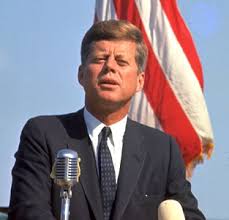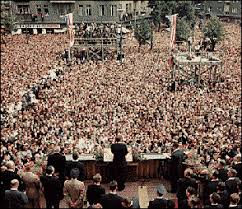November 22, 2013, will mark the 50th anniversary of the assassination of President John Fitzgerald Kennedy.
It’s one of those infamous dates that its eyewitnesses will never forget–in a class with
- December 7, 1941 (Pearl Harbor),
- April 12, 1945 (the death of President Franklin D. Roosevelt and
- September 11, 2001 (Al Qaeda’s attacks on the Pentagon and World Trade Center).
Some have called the Kennedy adminsitration a golden era in American history.

A time when touch football, lively White House parties, stimulus to the arts and the antics of the President’s children became national obsessions.
Others have called the Kennedy Presidency a monument to the unchecked power of wealth and ambition. An administration staffed by young novices playing at statesmen, riddled with nepotism, and whose legacy includes the Bay of Pigs, the Vietnam war and the world’s first nuclear confrontation.
While Americans continue to disagree about the legacy of JFK, there is no disagreement that his Presidency came to a sudden and shocking end just two years, ten months and two days after it had all begun.
The opening days of the Kennedy Presidency raised hopes for a dramatic change in relations between the United States and the Soviet Union.
But detente was not possible then. The Russians had not yet experienced their coming agricultural problems and the setback in Cuba during the Missile Crisis. And the United States had not suffered reversals in Vietnam.
Kennedy’s first brush with international Communism came on April 17, 1961, with the invasion of Cuba at the Bay of Pigs. This operation had been planned and directed by the Central Intelligence Agency during the final months of the Presidency of Dwight D. Eisenhower.
About 1,400 Cuban exiles were to be landed on the island to overthrow the Communist government of Fidel Castro. They were supposed to head into the mountains–as Castro himself had done against the dictatorship of Fulgencio Batista in 1956–and raise the cry of revolution.
The U.S. Navy would supply transport after an American air strike had knocked out the Cuban air force. But the airstrike failed and Kennedy, under the pressure of world opinion, called off a second try.
Even so, the invasion went ahead. When the invaders surged onto the beaches, they found Castro’s army waiting for them. Many of the invaders were killed on the spot. Others were captured–to be ransomed by the United States in December, 1962, in return for medical supplies.
It was a major public relations setback for the newly-installed Kennedy administration, which has raised hopes for a change in American-Soviet relations.
Kennedy, trying to abort widespread criticism, publicly took the blame for the setback: “There’s an old saying that victory has a hundred fathers and defeat is an orphan. Further statements, detailed discussions, are not to conceal responsibility because I’m the responsible officer of the Government.”
The Bay of Pigs convinced Kennedy that he had been misled by the CIA and the Joint Chieifs of Staff. Out of this came his decision that, from now on, he would rely more heavily on the counsel of his brother, Robert, whom he had installed as Attorney General.
Another consequence of the failed Cuban invasion: It convinced Soviet Premier Nikita S. Khrushchev that Kennedy was weak.
Khrushchev told an associate that he could understand if Kennedy had not decided to invade Cuba. But once he did, Kennedy should have gone all the way and wiped out Castro.
Khrushchev attributed this to Kennedy’s youth, inexperience and timidity–and believed he could bully the President.
On June 4, 1961, Kennedy met with Khrushchev in Vienna to discuss world tensions. Khrushchev threatened to go to nuclear war over the American presence in West Berlin–the dividing line between Western Europe, protected by the United States, and Eastern Europe, controlled by the Soviet Union.
Kennedy, who prized rationality above all else, was shaken by Knhrushchev’s unexpected rage. Emerging from the conference, he told an associate: “It’s going to be a cold winter.”
Meanwhile, East Berliners felt the door was about to slam on their access to West Berlin, and a flood of 3,000 refugees daily poured into West Germany.
Khrushchev was clearly embarrassed at this clear showing of the unpopularity of the Communist regime. In August, he orderd that a concrete wall–backed up by barbed wire, searchlights and armed guards–be erected to seal off East Berlin.
That same year, when tensions mounted and a Soviet invasion of West Berlin seemed likely, Kennedy sent additional troops to the city in a massive demonstration of American will.
Two years later, in June, 1963, during a 10-day tour of Europe, Kennedy visited Berlin to deliver his “I am a Berlinner” speech to a frenzied crowd of thousands.

JFK adddresses crowds at the Berlin Wall
Standing within gunshot of the Berlin wall, he lashed out at the Soviet Union and praised the citizens of West Berlin for being “on the front lines of freedom” for more than 20 years.
“All free men, wherever they may live,” said Kennedy, “are citizens of Berlin. And therefore, as a free man, I take pride in the words, ‘Ich ben ein Berlinner.'”
BAY OF PIGS, BERLIN WALL, BILL CLINTON, BRUCE GREENWOOD, CARLOS MARCELLO, CIA, CIVIL RIGHTS, CLIFF ROBERTSON, CUBAN MISSILE CRISIS, DAVID HALBERSTAM, FACEBOOK, FBI, FIDEL CASTRO, FRANK SINATRA, ICH BEN EIN BERLINNER SPEECH, INTERNET MOVIE DATABASE, J. EDGAR HOOVER, JAMES MARSDEN, JOHN F. KENNEDY, JOSEPH MCCARTHY, JOSEPH P. KENNEDY, LYNDON B. JOHNSON, MAFIA, MALCOM X, MARTIN LUTHER KING, MARTIN SHEEN, MOVIES, NIKITA KHRUSHCHEV, NUCLEAR TEST BAN TREATY, PT-109, ROBERT F. KENNEDY, ROBERT S. MCNAMARA, SAM GIANCANA, SANTOS TRAFFICANTE, SATURDAY NIGHT LIVE, SOVIET UNION, THE BEST AND THE BRIGHTEST, THE BUTLER, THE MISSILES OF OCTOBER, THE RAT PACK, THIRTEEN DAYS, TWILIGHT ZONE, TWITTER, VIETNAM WAR, WILLIAM DEVANE, WILLIAM PETERSEN
JFK: FIFTY YEARS AFTER DALLAS: PART ONE (OF TEN)
In Bureaucracy, History, Politics, Social commentary on August 15, 2013 at 11:16 amNovember 22, 2013, will mark the 50th anniversary of the assassination of President John Fitzgerald Kennedy.
It’s one of those infamous dates that its eyewitnesses will never forget–in a class with
Some have called the Kennedy adminsitration a golden era in American history.
A time when touch football, lively White House parties, stimulus to the arts and the antics of the President’s children became national obsessions.
Others have called the Kennedy Presidency a monument to the unchecked power of wealth and ambition. An administration staffed by young novices playing at statesmen, riddled with nepotism, and whose legacy includes the Bay of Pigs, the Vietnam war and the world’s first nuclear confrontation.
While Americans continue to disagree about the legacy of JFK, there is no disagreement that his Presidency came to a sudden and shocking end just two years, ten months and two days after it had all begun.
The opening days of the Kennedy Presidency raised hopes for a dramatic change in relations between the United States and the Soviet Union.
But detente was not possible then. The Russians had not yet experienced their coming agricultural problems and the setback in Cuba during the Missile Crisis. And the United States had not suffered reversals in Vietnam.
Kennedy’s first brush with international Communism came on April 17, 1961, with the invasion of Cuba at the Bay of Pigs. This operation had been planned and directed by the Central Intelligence Agency during the final months of the Presidency of Dwight D. Eisenhower.
About 1,400 Cuban exiles were to be landed on the island to overthrow the Communist government of Fidel Castro. They were supposed to head into the mountains–as Castro himself had done against the dictatorship of Fulgencio Batista in 1956–and raise the cry of revolution.
The U.S. Navy would supply transport after an American air strike had knocked out the Cuban air force. But the airstrike failed and Kennedy, under the pressure of world opinion, called off a second try.
Even so, the invasion went ahead. When the invaders surged onto the beaches, they found Castro’s army waiting for them. Many of the invaders were killed on the spot. Others were captured–to be ransomed by the United States in December, 1962, in return for medical supplies.
It was a major public relations setback for the newly-installed Kennedy administration, which has raised hopes for a change in American-Soviet relations.
Kennedy, trying to abort widespread criticism, publicly took the blame for the setback: “There’s an old saying that victory has a hundred fathers and defeat is an orphan. Further statements, detailed discussions, are not to conceal responsibility because I’m the responsible officer of the Government.”
The Bay of Pigs convinced Kennedy that he had been misled by the CIA and the Joint Chieifs of Staff. Out of this came his decision that, from now on, he would rely more heavily on the counsel of his brother, Robert, whom he had installed as Attorney General.
Another consequence of the failed Cuban invasion: It convinced Soviet Premier Nikita S. Khrushchev that Kennedy was weak.
Khrushchev told an associate that he could understand if Kennedy had not decided to invade Cuba. But once he did, Kennedy should have gone all the way and wiped out Castro.
Khrushchev attributed this to Kennedy’s youth, inexperience and timidity–and believed he could bully the President.
On June 4, 1961, Kennedy met with Khrushchev in Vienna to discuss world tensions. Khrushchev threatened to go to nuclear war over the American presence in West Berlin–the dividing line between Western Europe, protected by the United States, and Eastern Europe, controlled by the Soviet Union.
Kennedy, who prized rationality above all else, was shaken by Knhrushchev’s unexpected rage. Emerging from the conference, he told an associate: “It’s going to be a cold winter.”
Meanwhile, East Berliners felt the door was about to slam on their access to West Berlin, and a flood of 3,000 refugees daily poured into West Germany.
Khrushchev was clearly embarrassed at this clear showing of the unpopularity of the Communist regime. In August, he orderd that a concrete wall–backed up by barbed wire, searchlights and armed guards–be erected to seal off East Berlin.
That same year, when tensions mounted and a Soviet invasion of West Berlin seemed likely, Kennedy sent additional troops to the city in a massive demonstration of American will.
Two years later, in June, 1963, during a 10-day tour of Europe, Kennedy visited Berlin to deliver his “I am a Berlinner” speech to a frenzied crowd of thousands.
JFK adddresses crowds at the Berlin Wall
Standing within gunshot of the Berlin wall, he lashed out at the Soviet Union and praised the citizens of West Berlin for being “on the front lines of freedom” for more than 20 years.
“All free men, wherever they may live,” said Kennedy, “are citizens of Berlin. And therefore, as a free man, I take pride in the words, ‘Ich ben ein Berlinner.'”
Share this: